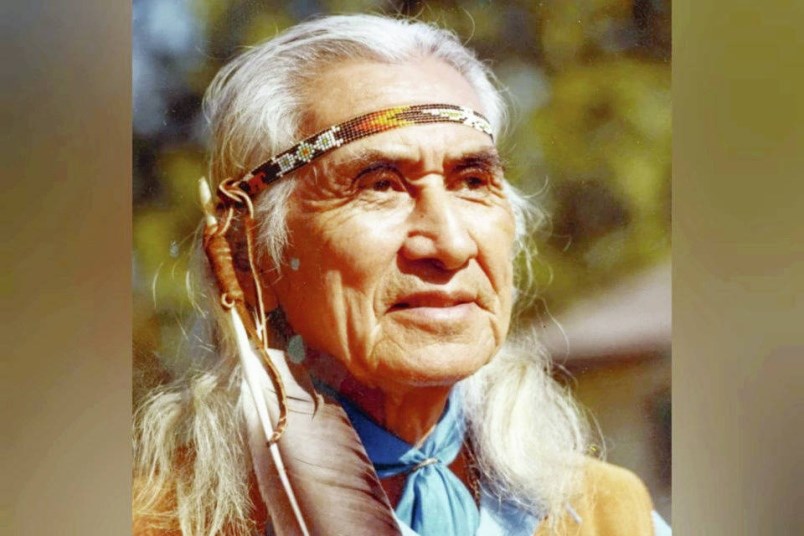On July 1, 1967, Chief Dan George delivered his Lament for Confederation during a celebration in Â鶹´«Ã½Ó³»to mark Canada’s 100th birthday.
“The man who took the boldest look into Canada’s future at her Empire Stadium birthday party Saturday was probably the person most tempted to look into the past,” the Â鶹´«Ã½Ó³»Sun reported.
A survivor of a residential school, George became known as an actor who starred in Little Big Man, a poet who wrote the book My Heart Soars, an activist and cultural leader. From 1951 to 1963, he was chief of what we now know as the Tsleil-Waututh Nation.
Not many people in the crowd on Dominion Day, 1967, would have known what to expect when George took the stage. As the Sun reported:
“The jubilant crowd of 32,000 at the birthday party in Empire Stadium was silenced by the moving — and bitter — soliliquy of Chief Dan George of the Burrard Indian Reserve.”
Here is what he said:
“How long have I known you, Oh Canada? A hundred years? Yes, a hundred years. And many, many seelanum more. And today, when you celebrate your hundred years, I am sad for all the Indian people throughout the land.
“For I have known you when your forests were mine; when they gave me my meat and my clothing. I have known you in your brooks and your rivers where your fish flashed and danced in the sun, where the waters said ‘come and eat of my abundance.’ I have known you in the freedom of your winds. And my spirit, like your winds, once roamed this good land.
“But in the long hundred years since the white man came, I‘ve seen that freedom disappear just like the salmon how they mysteriously go out to sea. The white man’s strange customs, I could not understand, pressed down upon me until I could no longer breathe.
“When I fought to protect my home and my land, I was called a savage. When I neither understood nor welcomed this new way of life, I was called lazy. When I tried to rule my people, I was stripped of my authority.
“My nation was ignored in your history textbooks — we were less important in the history of Canada than the buffalo that ranged the plains. I was ridiculed in your plays and motion pictures, and when I drank the fire-water, I got drunk — very, very drunk. And I forgot.
“Oh Canada, how can I celebrate with you this centenary, this hundred years? Shall I thank you for the reserves that are left me of my beautiful forests? Shall I thank you for the canned fish of my river? Shall I thank you for the loss of my pride and authority, even among my own people? For the lack of my will to fight back? No! I must forget what is past and gone.
“Oh God in heaven! Give me back the courage of the olden chiefs. Let me wrestle with my surroundings. Let me once again, as in the days of old, dominate my environment. Let me humbly accept this new culture and through it rise up and go on.
“Oh God! Like the thunderbird of old I shall rise again out of the sea; I shall grab the instruments of the white man’s success — his education, his skills, and with these new tools I shall build my race into the proudest segment of your society. And before I follow the great chiefs who have gone before us, I shall see these things come to pass.
“I shall see our young braves and our chiefs sitting in the houses of law and government, ruling and being ruled by the knowledge and freedoms of our great land. So shall we shatter the barriers of our isolation. So shall the next hundred years be the greatest in the proud history of our tribes and nations.”
Fifty-four years later, the words of Chief Dan George are perhaps more powerful than ever.


